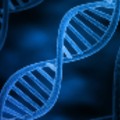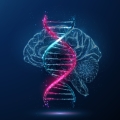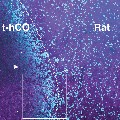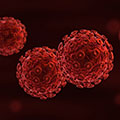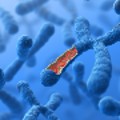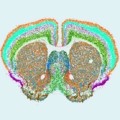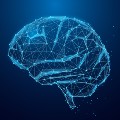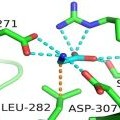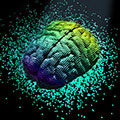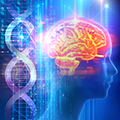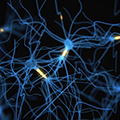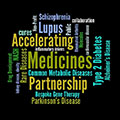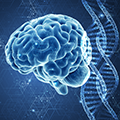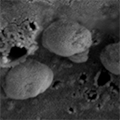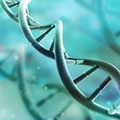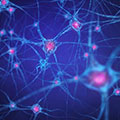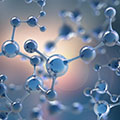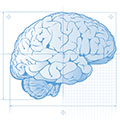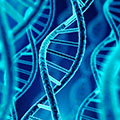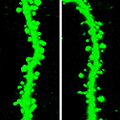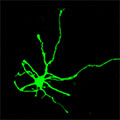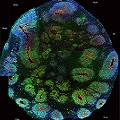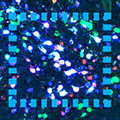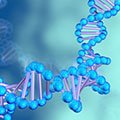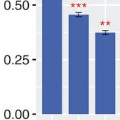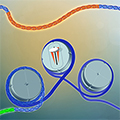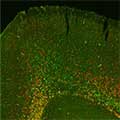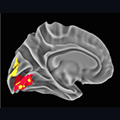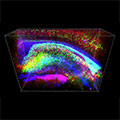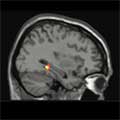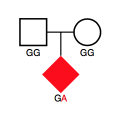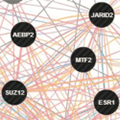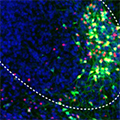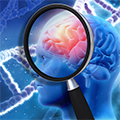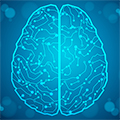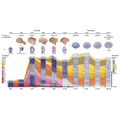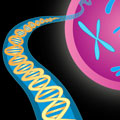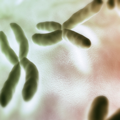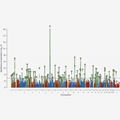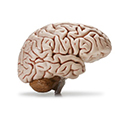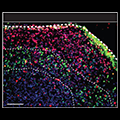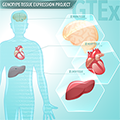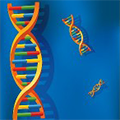Science Updates About Genetics
- Study Illuminates the Genetic Architecture of Bipolar Disorder
-
Largest-ever genome-wide study of a diverse group of people with bipolar disorder sheds new light on the genetic architecture underlying the disorder.
- New Gene Delivery Method Paves the Way for Advanced Brain Therapies
-
A new study, funded in part by the National Institute of Mental Health, describes a promising new gene delivery vehicle that could advance treatment for brain disorders.
- Scientists Map Networks Regulating Gene Function in the Human Brain
-
An NIMH-funded research consortium has produced the largest and most advanced multidimensional maps of gene regulation networks in the brains of people with and without mental disorders.
- Gene-Based Therapy Restores Cellular Development and Function in Brain Cells From People With Timothy Syndrome
-
In a proof-of-concept study, researchers demonstrated the effectiveness of a potential new therapy for Timothy syndrome, an often life-threatening and rare genetic disorder that affects a wide range of bodily systems, leading to severe cardiac, neurological, and psychiatric symptoms as well as physical differences such as webbed fingers and toes.
- Decades of Dedication and Collaboration: Unraveling the HIV Mystery
-
• 75th Anniversary
In celebration of NIMHs 75th anniversary, we reflect on decades of work by the institute to understand and eradicate HIV.
- Researchers Expand Understanding of Genetic Mechanisms Underlying Fragile X Syndrome
-
An NIMH-supported study of the 3D genome revealed widespread silencing of genes with important roles in brain function in fragile X syndrome and related disorders.
- Scientists Unveil Complete Cell Map of a Whole Mammalian Brain
-
For the first time ever, an international team of researchers has created a complete cell atlas of a whole mammalian brain.
- Scientists Unveil Detailed Cell Maps of the Human Brain and the Nonhuman Primate Brain
-
A group of international scientists have mapped the genetic, cellular, and structural makeup of the human brain and the nonhuman primate brain, allowing for a deeper knowledge of the cellular basis of brain function and dysfunction, helping pave the way for a new generation of precision therapeutics for people with mental disorders and other disorders of the brain.
- Researchers Solve the Puzzle of a Brain Receptor’s Activation
-
Researchers in a NIMH-supported study identified a new receptor for glycine that helps enhance communication between nerve cells in the brain and offers a potential new target for treating mental disorders.
- Researchers Unlock Genetic Mutations Contributing to Disorders in the Brain
-
Researchers identified novel genes with mosaic mutations contributing to treatment-resistant pediatric epilepsy and pointing to specific disrupted pathways in cortical development.
- New NIH Study Reveals Shared Genetic Markers Underlying Substance Use Disorders
-
Analyzing genomic data from more than 1 million people, researchers have identified genes that are commonly inherited across substance use disorders, regardless of the substance being used.
- Researchers Map the Genetic Landscape of Schizophrenia in the Brain
-
In a comprehensive postmortem genetic analysis of the caudate nucleus in the brain, NIMH-supported researchers identified many genes associated with schizophrenia risk, including a gene that regulates the flow of the chemical messenger dopamine.
- NIH BRAIN Initiative Launches Projects to Develop Cell Atlases and Molecular Tools for Cell Access
-
The National Institutes of Health has launched two transformative projects supported by the Brain Research Through Advancing Innovative Neurotechnologies® (BRAIN) Initiative: The BRAIN Initiative® Cell Atlas Network and the Armamentarium for Precision Brain Cell Access.
- Autism and Congenital Heart Disease Share Underlying Molecular Network
-
A recent study of gene networks may hold some promising clues about shared mechanisms underlying autism spectrum disorder and congenital heart disease, two physiologically distinct disorders that often co-occur.
- NIH, FDA and 15 Private Organizations Join Forces to Increase Effective Gene Therapies for Rare Diseases
-
The newly launched Bespoke Gene Therapy Consortium (BGTC), part of the NIH Accelerating Medicines Partnership (AMP) program, aims to optimize and streamline the gene therapy development process to help fill the unmet medical needs of people with rare diseases.
- NIH BRAIN Initiative Unveils Detailed Atlas of the Mammalian Primary Motor Cortex
-
The NIH Brain Research Through Advancing Innovative Neurotechnologies® (BRAIN) Initiative Cell Census Network (BICCN) has unveiled an atlas of cell types and an anatomical neuronal wiring diagram for the mammalian primary motor cortex, derived from detailed studies of mice, monkeys, and humans.
- Genomic Data From More Than 41,000 People Shed New Light on Bipolar Disorder
-
In the largest genome-wide association study of bipolar disorder to date, researchers found about twice as many genetic locations associated with bipolar disorder as reported in previous studies. These and other findings help improve our understanding of the biological origins of bipolar disorder.
- Researchers Use Exosome-Based Strategy to Block HIV in Mice
-
In this NIMH-funded study, researchers used exosomes to deliver novel protein into the cells of mice infected with HIV. The protein attached to HIV’s genetic material and prevented it from replicating, resulting in reduced levels of HIV in the bone marrow, spleen, and brain.
- Gene Readouts Contribute To Distinctness of Mental Disorders
-
A new study conducted by researchers at NIMH suggests that differences in the expression of gene transcripts – readouts copied from DNA that help maintain and build our cells – may hold the key to understanding how mental disorders with shared genetic risk factors result in different patterns of onset, symptoms, course of illness, and treatment responses.
- NIH-funded Study Sheds Light on Abnormal Neural Function in Rare Genetic Disorder
-
A genetic study has identified neuronal abnormalities in the electrical activity of cortical cells derived from people with a rare genetic disorder called 22q11.2 deletion syndrome.
- Genetic Variations Highlight the Importance of Metabolic Processes in Anorexia
-
The need to identify effective targets for intervention in anorexia nervosa is pressing, as patient outcomes are often poor. An NIMH-funded genome-wide association study suggests that metabolic processes may play an important role in the disorder, offering a promising new avenue for investigation.
- Study Shows Highly Reproducible Sex Differences in Aspects of Human Brain Anatomy
-
A scientific analysis of more than 2,000 brain scans found evidence for highly reproducible sex differences in the volume of certain regions in the human brain.
- Large-Scale Genetics Study Sheds Light on Developmental Origins of Autism
-
Researchers were able to identify different types of rare genetic variations associated with autism spectrum disorder by analyzing data shared via the NIMH-funded Autism Sequencing Consortium.
- Schizophrenia Risk Gene Linked to Cognitive Deficits in Mice
-
Mice with an impaired version of one the few genes definitively linked to schizophrenia showed abnormalities in working memory, mimicking those commonly seen in schizophrenia patients.
- Gene Regulators Work Together for Oversized Impact on Schizophrenia Risk
-
Gene expression regulators work together to raise an individual’s risk of developing schizophrenia. Schizophrenia-like gene expression changes modeled in human neurons matched changes found in patients’ brains.
- 2,000 Human Brains Yield Clues to How Genes Raise Risk for Mental Illnesses
-
PsychENCODE researchers are discovering the biological mechanisms by which mental illness risk genes work in the human brain.
- NIH BRAIN Initiative Debuts Cell Census of Mouse Motor Cortex – for Starters
-
NIH BRAIN Initiative Cell Census Network (BICCN) has debuted its first data release, which focuses on motor cortex. In a related development, researchers have discovered cellular secrets of key social behaviors – mating, parenting, and aggression – in mouse hypothalamus.
- Inherited Variations in Noncoding Sections of DNA Associated with Autism
-
A new study has identified an association between paternally-inherited rare structural variants in noncoding segments of genes and the development of autism spectrum disorder (ASD). The study adds to a growing body of research describing genetic contributors to ASD.
- Suspect Molecules Overlap in Autism, Schizophrenia, Bipolar Disorder
-
Depression, schizophrenia and autism spectrum disorder share some of the same patterns of suspect gene expression – molecular signatures.
- NIH Completes Atlas of Human DNA Differences that Influence Gene Expression
-
NIH researchers have completed an atlas documenting how DNA influence human gene expression.
- Breakthrough Method Yields Trove of Neuron Subtypes, Gene Regulators
-
Scientists have discovered a trove of neuronal subtypes by identifying their unique epigenomic signatures.
- Our Brains Harbor “Residual Echo” of Neanderthal Genes
-
Researchers have produced the first direct evidence that parts of our brains implicated in mental disorders may be shaped by a “residual echo” from our ancient past. The more a person’s genome carries genetic vestiges of Neanderthals, the more certain parts of his or her brain and skull resemble those of humans’ evolutionary cousins that went extinct 40,000 years ago.
- NIMH Grantee Wins One of Science’s Most Coveted Prizes
-
NIMH grantee Karl Deisseroth, M.D., Ph.D., of Stanford University, has been awarded one of science’s most generous prizes. A German foundation presented the inventor of technologies that are transforming neuroscience with its 4 million euros Fresenius Prize.
- Estrogen Alters Memory Circuit Function in Women with Gene Variant
-
Brain scans reveal that fluctuations in estrogen can trigger atypical functioning in a key brain memory circuit in women with a common version of a gene. Since working memory function is often disturbed in mental disorders, such gene-hormone interactions are suspect mechanisms that may confer risk.
- Delayed Walking May Signal Spontaneous Gene Anomalies in Autism
-
Researchers have discovered a pattern of genetic glitches and behavioral features, such as delayed walking, in some cases of autism spectrum disorder (ASD) that could ultimately lead to identification of subgroups and improved treatment.
- A Third of Suspect Mutations in ASD Just “Noise”
-
Researchers have narrowed suspected genetic causes of autism and related developmental disabilities by ruling out what they call the “noise of benign variation.”
- Sex Hormone–Sensitive Gene Complex Linked to Premenstrual Mood Disorder
-
Researchers have discovered molecular mechanisms that may underlie a woman’s susceptibility to disabling irritability, sadness, and anxiety in the days leading up to her menstrual period.
- Molecular Tool Parses Social Fear Circuit Intertwined with Aggression Hub
-
A genetic engineering tool has disentangled seemingly hopelessly intertwined brain circuits for social fear and aggression in mice.
- Worldwide Study Seeks to Unlock the Brain’s Genetic Code
-
Big data pinpoints genetic variation linked to brain volume and risk for disorders.
- NIH Nearly Doubles Investment in BRAIN Initiative Research
-
NIH’s third round of grants to support the goals of the Brain Research through Advancing Innovative Neurotechnologies (BRAIN) Initiative total just over $150 million.
- Powered-Up Probe ID’s Schizophrenia Genes That Stunt Brain Development
-
Scientists have pinpointed several schizophrenia-related gene variants that alter expression of other genes in illness-implicated circuitry of the human brain.
- Schizophrenia, Autism Risk Gene Trajectories Point to Shared Causes
-
Schizophrenia, autism risk gene trajectories point to shared causes
- Tapping Crowd-Sourced Data Unearths a Trove of Depression Genes
-
Scientists have discovered 15 genome sites – the first ever – linked to depression in people of European ancestry. But – in a twist – the researchers didn’t have to sequence anyone’s genes! Instead, they analyzed data already shared by people who had purchased their own genetic profiles via an online service and elected to participate in its research option.
- Genome-Wide Study Yields Markers of Lithium Response
-
Genome-Wide Study Yields Markers of Lithium Response
- Schizophrenia’s Strongest Known Genetic Risk Deconstructed
-
Versions of a gene linked to schizophrenia may trigger runaway pruning of the teenage brain’s still-maturing communications infrastructure.The gene switched on more in people with the suspect versions, who faced a higher risk of developing the disorder.
- NIH-supported NeuroBioBank Joins Autism BrainNet in Brain Donation Initiative
-
Two of the world’s largest brain tissue banks unify efforts to collect and distribute a critical number of brain donations for important autism research.
- A Patient’s Budding Cortex -- in a Dish?
-
Scientists have perfected mini cultured 3-D structures that grow and function much like the outer mantle – the key working tissue, or cortex – of the brain of the person from whom they were derived.
- GTEx Findings Reveal New Insights into how DNA Differences Influence Gene Activity, Disease Susceptibility
-
Data resource begins to reveal how genetic variability influences key tissues in health and disease.
- Disorders Share Risk Gene Pathways for Immune, Epigenetic Regulation
-
Risk genes for different mental disorders work through same pathways

